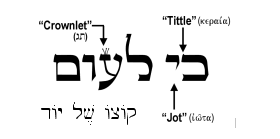Reading the Bible in translation is like kissing your bride through the veil.
~ Rabbi Haim Nahman Bialik
- Enhance Your Understanding of God’s Word
If you want to know what God said you have to read His words in the language in which it was written. Translation puts you an arm’s length away from the original meaning. It is as if you have let someone in between you and God’s message.
Hebrew is the original language of the Bible. It is the language in which the prophets recorded and expressed the revelations they received from the Almighty. If you want to understand the Old Testament, you will want to study it in their words, that is, Hebrew.
Reading a translation of the Bible is like watching a black and white television when you could have a color one.
One example: The word יִרְאַה yirah, in Hebrew, can mean fear (anxiety) or reverence, respect and awe. In the King James Version of the Bible each of the 41 times it appears, yirah is translated as fear. Is the God you know one who engenders fear or reverence?
Martin Luther wrote:
“The Hebrew language is the best language of all … If I were younger I would want to learn this language, because no one can really understand the Scriptures without it. For although the New Testament is written in Greek, it is full of Hebraisms and Hebrew expressions. It has therefore been aptly said that the Hebrews drink from the spring, the Greeks from the stream that flows from it, and the Latins from a downstream pool.”
- Understanding Hebrew Customs and Culture Enhances Your Understanding of the Bible
Understanding the Hebrew language gives you a window into their way of understanding the world. In addition to studying the language, studying their culture and customs gives you a better understanding of the context in which the words were written. The Hebrew language is a language of action, based on verbs, where Greek and Latin based languages are based on nouns. To “know” something in Hebrew, is to learn it by experience; you know by participating. Understanding Hebrew customs and language usage expands your knowledge of the words in the Bible. Additionally, Hebrews use a considerable amount symbolism in their speaking and writing. Studying Hebraic cultural symbolism will be a vital addition to your understanding of the Bible.
- Hebrew and Hebrew Culture Is the Foundation of the New Testament
Jesus both spoke and read Hebrew (see Matt. 5:18, Luke 4:16-20, Acts 26:14). Jesus was a Hebrew. Hebrew is the cultural foundation of the New Testament, in fact, all of the original authors of the New Testament were Hebrews who spoke and read Hebrew (see Acts 21:40, 22:2; John 5:2; Luke 23:28; Acts 15:13-21). Studying Hebrew will give you new insight into the meaning of the New Testament writings because they are based in the culture of the Hebrews of the Old Testament. You simply cannot readily understand the meaning of the New Testament authors without understanding of the Hebraic mindset that underlies their message. Many problems in interpretation and explanation of doctrine arise because non-Jews have imposed a Greek/Western mindset onto the pages of the Hebrew/Jewish Scriptures. People raised with a Western (Greek) mindset have a very different world view than a Hebrew world view.
- Hebrew is the Language of Freedom
Hebrew is a classical language, steeped with culture and history throughout the world. The migrations of the Hebrews have influenced much of the world, including early Greece, northern Europe and Scandinavia. The migrations of the “Lost” Ten Tribes have influenced the culture, language and ideas of freedom from Europe, to Scandinavia, to England and finally to the Americas. The Ten Tribes carried the government of freedom the High Priest, Jethro, passed on to Moses.
- Hebrew / Jewish Culture Literacy
The study of Hebrew will enable you to better comprehend Jewish concepts and literature. You will be able to better appreciate the struggle of the Jewish people over the millennia and more effectively sympathize with their collective plight. You will begin to delight in your shared destiny as a child of Abraham by faith, enjoying the covenantal blessings given to the patriarchs. You will understand the importance of Shabbat, the Jewish Holidays, and how they are best understood from a Messianic perspective.
- Every “Jot” and “Tittles”
The Lord Jesus told his disciples that not one “jot” or “tittle” will pass away from the Law until all is fulfilled (see Matt. 5:18). The word translated “jot” (iota, in the Greek New Testament) refers to the smallest Hebrew letter (י “Yod”), and the word translated “tittle” (keraia in Greek) refers to the “horn,” or smallest stroke of a Hebrew letter, something like a “serif’” in our modern English typefaces.
The smallest stroke of the smallest letter of the Hebrew text was important to Jesus, and, if we esteem the Scriptures as He did, we also will pay attention to the details of the Sacred Writings. But how can we determine what a “jot” or a “tittle” is without having a knowledge of the original Hebrew text?

- The Language of Modern Israel
Hebrew is the only ancient language to have been revived as a modern spoken language. Today Hebrew still serves as the language of Judaism, and is also the official language of the state of Israel. Your study of Hebrew will help you better appreciate modern Jewish culture and the people living in Israel.
- Learning a Language Makes Your Brain Grow
Those who learn a second language show brain growth in four areas, memory and learning, three areas of executive functioning. In addition, multilingual persons are better at reasoning, at multitasking, at grasping and reconciling conflicting data. Bilingual brains are more efficient and may be responsible for greater mental longevity. These reasons alone are worth learning a language, so why not Hebrew so your understanding of the God’s word can be improved?
